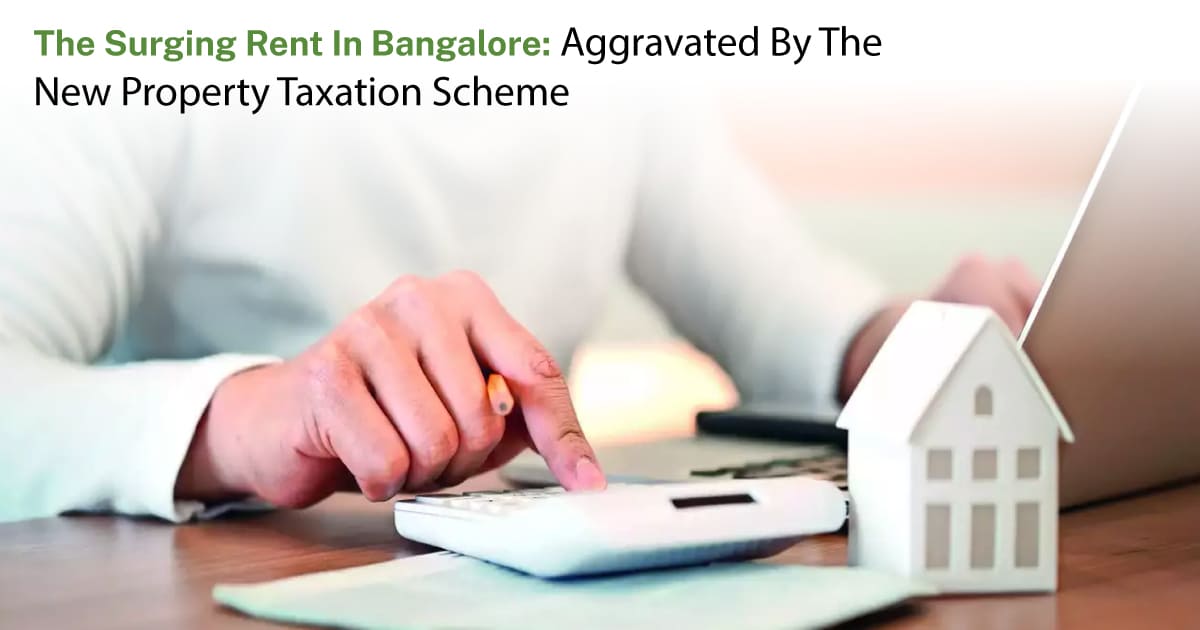
The Surging Rent in Bangalore: Aggravated by the New Property Taxation Scheme
The growth engine of India’s IT industry, present-day Bangalore is a melting pot of people and cultures from all over the country. This cosmopolitan hub draws thousands of young and aspiring professionals to the city with its thriving technology hub, stunning infrastructure, and fascinating fusion of cultures. This increasing urbanisation in the city in a short period of time has, however, led to a steadily rapid increase in apartment rents.
As per reports by a leading real estate consultancy, rents in the Silicon City of India will hike by as much as 30% in 2023. This surge in rent can be attributed to many factors, from the increased population to the limited inventory of homes available in the desired areas. While many new residential communities have been developed in recent years, they also come with exorbitant rentals due to the wide array of luxurious amenities and lifestyles they offer.
If reports circulating in the industry are to be believed, the year 2024 is not likely to bring any reprieve. On the contrary, in a rather controversial move, the local municipal corporation, Bruhat Bengaluru Mahanagara Palike (BBMP), has recently proposed a guidance-based taxation framework.
The Old System Vs the New System
As per the proposal, property tax will now be collected on the basis of guidance value or circle rate, as opposed to the previously used zonal classification. As per the civic body, the existing taxation framework gave a lot of leeway to the BBMP officials to change the zonal classification and therefore tamper with the property tax that needs to be paid.
On the other hand, according to the new proposed system, the property tax would be computed by combining two factors: the size of the plot and the total built-up area. Depending on the property type, a certain percentage of the guidance value is assigned to it. In addition to this, the second component is a certain percentage of the construction cost of the built-up area. This amount is then supposed to be divided by an annual depreciation of 3% every year, with the upper limit constrained to 60%.
Before we delve into what the ramifications and oppositions of this proposal are if it were to be approved, let us first understand what guidance value is.
Guidance value is the minimum price of real estate assets as ascertained by the authorised government agency. This is done to minimise undervaluation of the assets and determine stamp duty, registration price, and taxes. On the other hand, market value is the cost of the property determined in a competitive real estate market based on various macro and microeconomic factors and is subject to external variables such as political conditions.
The Concerns Swirlings Around the New System
Now, let us proceed to discuss the changes that are likely to take place once the new system is adopted from 1st April. As per one of the most contentious changes, owners of rental properties will now have to pay double the tax as opposed to those with personally used properties. While those with self-occupied properties will be required to pay 0.1% of the guidance rates, those with rental properties will be required to pay 0.2% of the guidance rates.
This has raised concerns that rents will rise in the city, a concern that intensified amidst the surging rents in the city. It must also be noted that it was only in the previous year that the guidance value in the city was raised significantly, even as much as 25–30% in certain areas, leading to a rental crisis. In light of this, the twofold increase in taxation is likely to further intensify the housing rental crisis.
Further, while formerly the outskirts of Silicon City were often considered affordable as compared to the city’s centre, the increase in guidance value in 2022 has led to these values being higher than the actual market price. The proposed shift is particularly significant in this case, as now the property owners will have to pay a higher property tax on their rentals than before.
Another concern amongst the public is that while the authorities affirm that the new taxation framework will rationalise and simplify calculating property taxation, only one-fourth of the 90,000 streets under the BBMP jurisdiction are assigned guidance values. This has led to many apartment complexes without one, paving the way for possible anomalies in the tax assessment.
The Response of Karnataka Home Buyers Forum
In light of these ramifications, the Karnataka Home Buyers Forum has recently written to the BBMP commissioner, seeking to draw attention to the adverse effects the proposal might have on the middle class. For one, the increase in property taxes is likely to spike the rent in the city, leading to a lack of affordable housing.
The body also requested that the government calculate property taxes in accordance with the actual carpet or usable area of the property. This request is quite reasonable, as RERA does mandate selling residential apartments according to the carpet area.
Conclusion:
The proposed changes in property taxation by BBMP have raised concerns about affordability and housing availability in Bangalore. While aiming to streamline the process, the potential twofold increase in property tax for rental properties could exacerbate the existing rental crisis. It’s crucial for policymakers to carefully balance these concerns to promote sustainable urban development.



